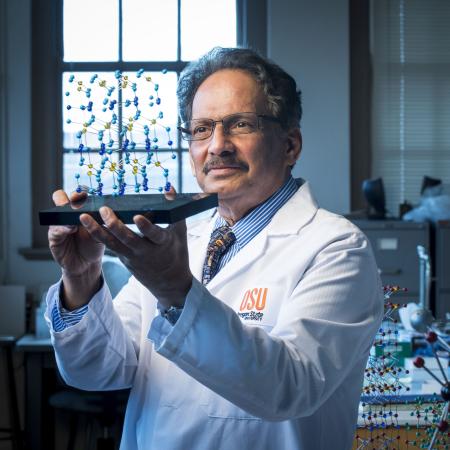Mathematics Professor Tevian Dray has received the 2017 Deborah and Franklin Tepper Haimo Award for Distinguished College or University Teaching of Mathematics from the Mathematical Association of America (MAA), in recognition of his exemplary mathematics teaching and his positive influence on college mathematics curriculum development and teacher training on a regional and national level.
He will be honored with the award at the 2017 Joint Mathematics Meetings(JMM) in Atlanta January 4-7. He is the first winner from Oregon State of this award since its inception nearly 25 years ago.
“Tevian Dray’s award is well-deserved and well-earned,” said Sastry Pantula, dean of OSU’s College of the Science. “We are very proud of him. His dedication to his discipline and to his students and colleagues sets a very high bar for teaching in the mathematical sciences.”
“We very much appreciate his continued work with our student success initiatives and math pathways," adds Pantula. "Tevian has enhanced the national recognition of our Department of Mathematics tremendously.”
Dray is a master teacher who consistently fosters curiosity and excitement in his hands-on, interactive classroom. He uses both alternative and non-traditional teaching methods as needed to empower students to discover themselves the beauty and depth hidden in mathematics. He has a particular knack for both timing and precision, asking just the right question to push a student to realize the surprising implication of their own argument or excavate an underlying theorem. And he knows when to remain quiet, knowing that it can be far more powerful to let students make mistakes and learn from each other.
Dray’s success is mirrored by his students’ assessments: more than 50% of his numerical evaluations in the past decade have ranked at least 5.8 on a 6.0 scale, and students comment consistently how he inspires them to be active learners and “removes barriers” through open yet expertly guided discussions.
Throughout the years, Dray has received numerous teaching awards, including the 2014 Elizabeth P. Ritchie Distinguished Professor Award, the University's highest teaching honor; the 2014 Distinguished Teaching Award of the Pacific Northwest section of the MAA; and the College of Science’s Loyd Carter Award for Outstanding and Inspirational Undergraduate Teaching and the Frederick Horne Award in 2004. In 2010, Dray was elected a Fellow of the American Physical Society for his work in relativity. He was named UHC Eminent Professor and UHC Outstanding Professor from OSU’s Honors College in 2012 and 2009 respectively.
"Good teaching is a joint effort between teacher and student," said Dray. "I am deeply moved by these awards, which recognize my good fortune in having been able to work with many, many dedicated students."
Dray has also made significant and original contributions to the national teaching of mathematics. His interdisciplinary strengths in math and physics—thanks to his early work in classical general relativity and his longtime collaboration with Physics Professor Corinne Manogue (his wife)—inspired him to make significant contributions to two pioneering, NSF-funded curriculum projects:
- Vector Calculus Bridge project, that Dray directs and which addresses the divide between how vector calculus is taught by mathematicians and how it is understood by physicists, and
- Paradigms in Physics project, that Corinne directs and is a complete redesign of the upper-division physics major
Recently, Dray designed a new course on Reference Frames and wrote an accompanying textbook that presents a geometric approach to relativity.
Dray has been a leader in teacher development throughout Oregon. At the Oregon Mathematics Leadership Institute (OMLI), he was part of the team that designed an OMLI course in non-Euclidean geometry that encouraged teachers to improve the quality of mathematical discourse in their classrooms by modeling instruction on an unfamiliar but accessible mathematical topic. He served as a co-PI of the Central Oregon Consortium, a Mathematics and Science Partnership providing professional development to middle-school math teachers in rural Oregon.
Dray received his bachelor of science in mathematics at the Massachusetts Institute of Technology and both his master’s and Ph.D. in mathematics from the University of California, Berkeley. He joined OSU’s mathematics faculty in 1988.




